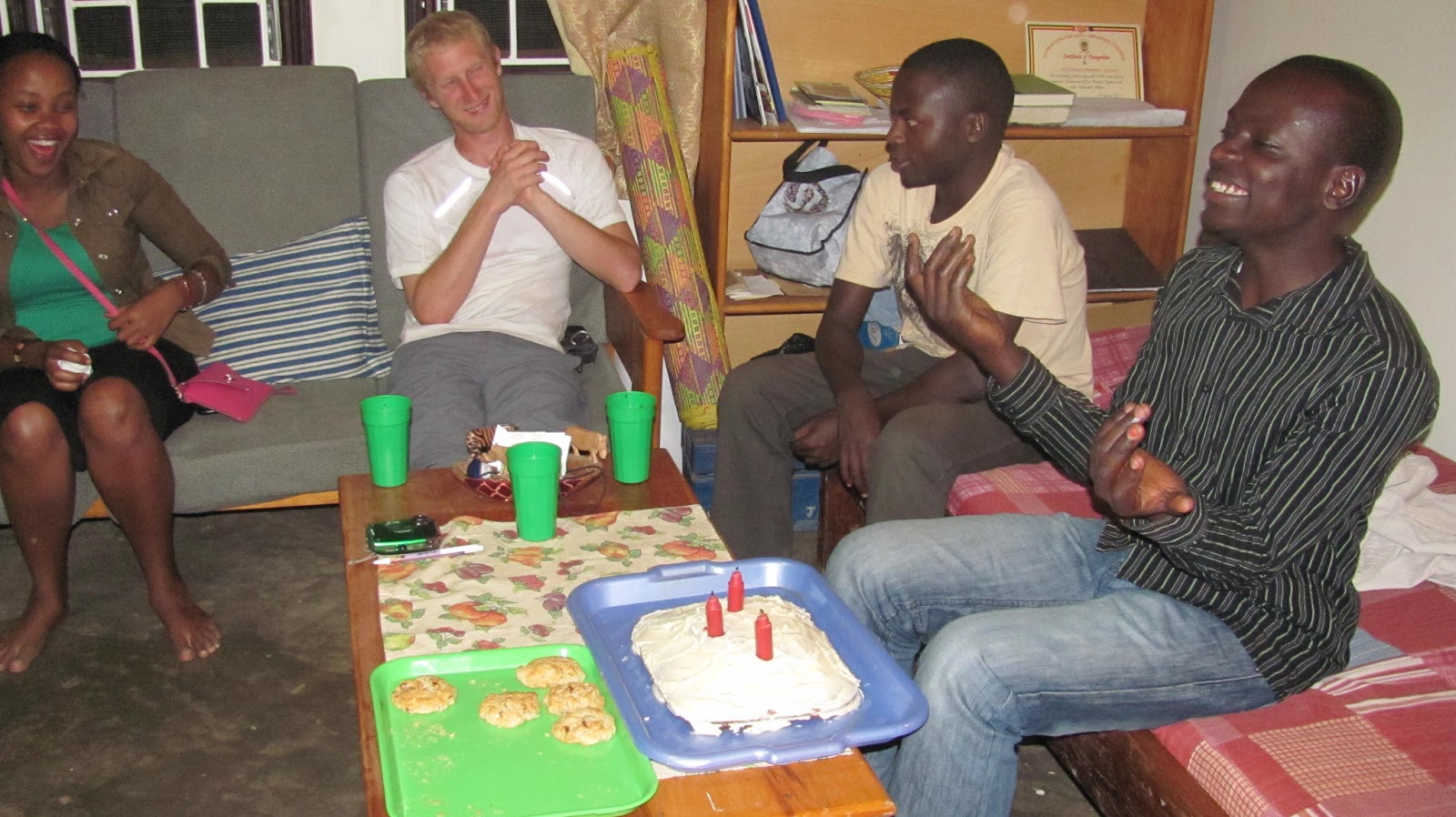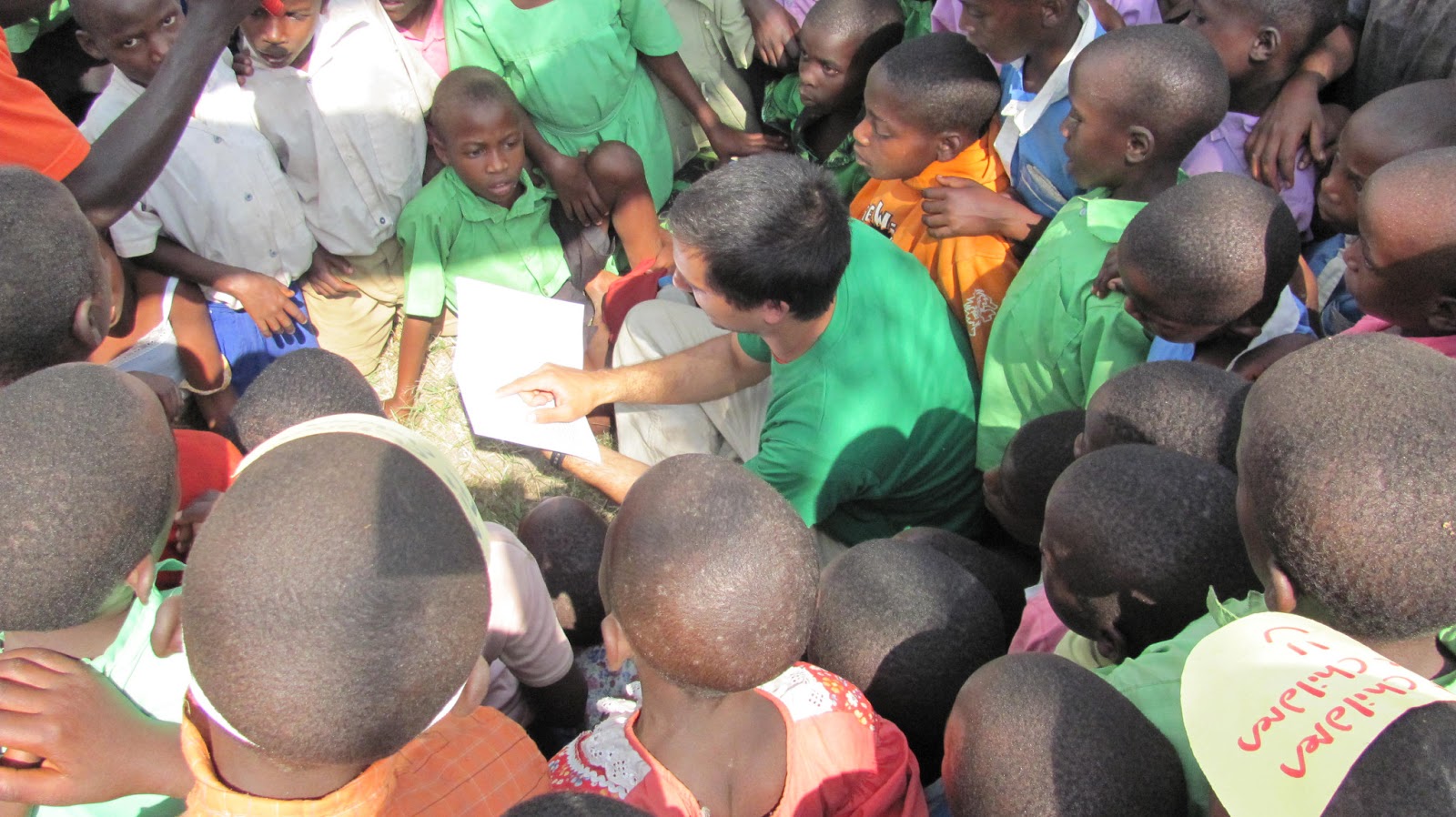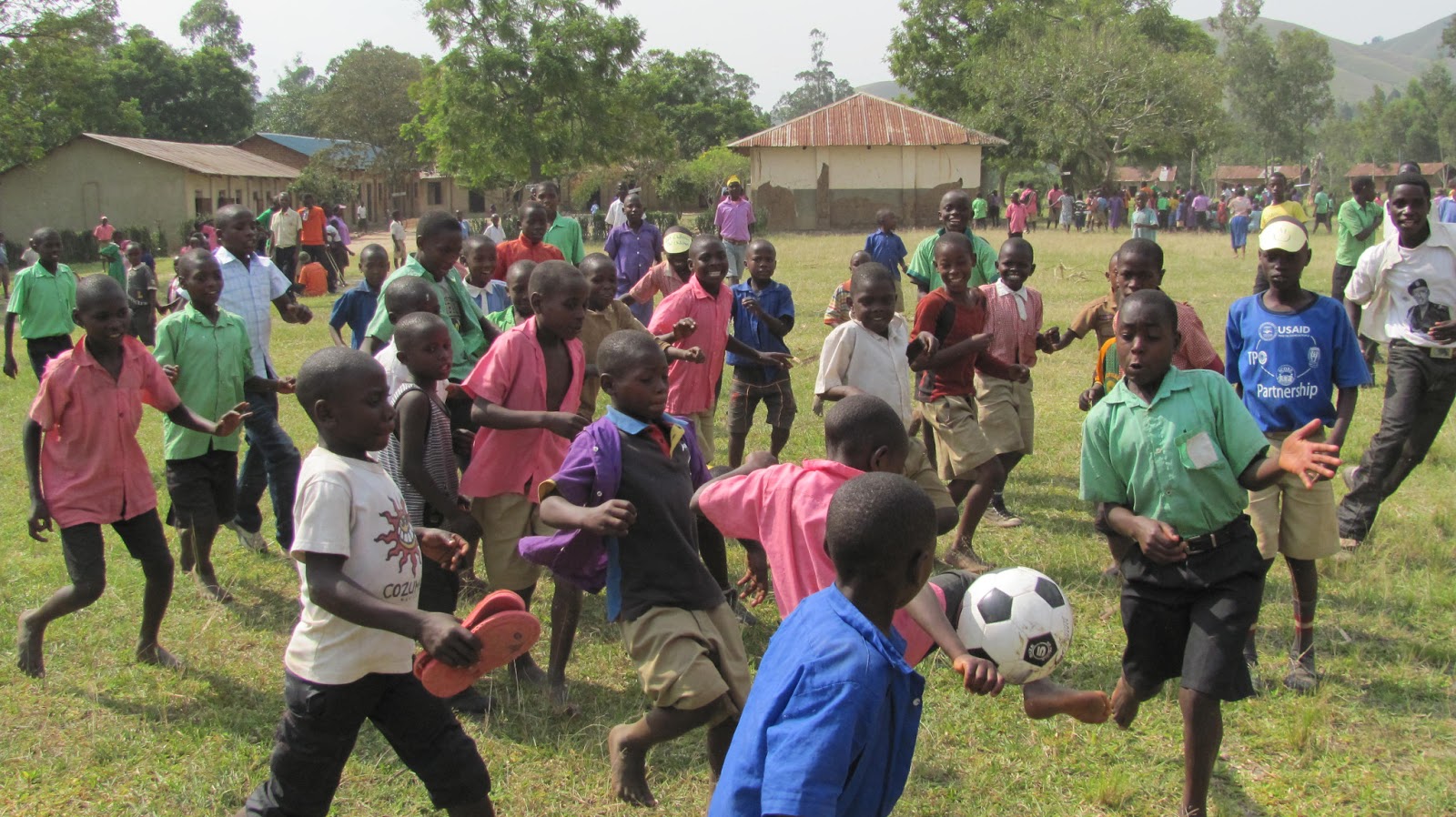Today is my last day in Uganda and I have
made a full circle and am sitting right where I began 7 weeks ago at Green
Valley in Entebbe, waiting for my red eye to depart. Today I walked through the
market, drank a Stoney, ate a rolex and had my last conversations with Boda
drivers – all things about this beautiful country that I will miss very much. I
am on my way back to Canada to stand up with my best friend on her wedding, but
I am leaving a place and a project that has become very dear to me, so
currently my feelings are a mixture of excitement and sadness. This is also the
first time I have been without at least one of my travel companions, and I sort
of feel like I am doing everything with my left hand – I sure will miss our
little family! But before I get too sentimental, I would like to recap some
very good days we had last week on the Project.
The day after our goat pass out we made our
way back to the FAOC demonstration farm and conducted paravet refresher
training. We had 14 of our current paravets attend the training and we
discussed some of the issues they are facing such as dealing with not
getting paid and not being respected in their communities.
After our initial discussions we made sure
everyone was on the same page regarding payment and then revised the price list
The most exciting part of the meeting was
when we gave out bags of colostrum donated by Saskatoon Colostrum (www.saskatooncolostrum.com),
a company founded by Dr. Debbie Hanes who is also a professor at WCVM. The
women were very interested in the product and we spent about an hour answering
their questions and explaining how, why and when to use it. We would like to
say a big thank you to the staff at Saskatoon Colostrum for their generous
donation and to Katie Nicol for carting it all the way from Saskatoon!
When the colostrum bags came out, many
women put on glasses and took out notebooks. We were encouraged to see their
eagerness to learn and impressed by all the questions they asked.
This is Margaret, a paravet and chairperson
for the Akatete group. She is also my self-proclaimed mother-in-law since she
has decided I should marry her son.
So once the paravets had left with their
colostrum we were free for the evening, which was lucky since we had to
celebrate the birthday of my a special Ms. Dedden. We went out to a local hotel
for supper and afterwards, while watching the Confederation Cup semi final soccer
match between Uruguay and Brazil (yes, I just had to Google the tournament
name); we met 2 veterinarians from Brazil who had been working with dairy
cattle. The evening flew by since the Brazilians were in a very good mood at
the end of the game and everyone was happy to “talk shop” for a while.
Awkward family photo number 2
The next morning we prepared for community
training and headed out to Kabelebele, the main village in the district we work
in, to spend the night with our good friend and translator Shafiq. He and his
mother have a lovely house and they were excellent hosts, with our only
complaint being that we could not even come close to eating as much as Shafiq’s
mom expected.
Here is the kitchen where our many large
meals were prepared, one of which was a beef stew made with the typical stewing
beef, plus rumen and intestine – it was a first taste for everyone and, as
usual, Elad did the best at cleaning his plate.
We DID manage to finish one meal, but only
because we strongly suggested that we did not need to have any matooke to go
with our rice and beans.
On Friday afternoon we held a training
session where we invited the communities within walking distance of the FAOC
demonstration farm to come learn more about goat production. We also encouraged
the paravets to attend the training and called on them to give their
perspective on each of our main points while we presented “the seven steps of
raising a healthy goat”.
About 60 beneficiaries and 6 paravets
attended the training. We hope to hold another training day for the more
distant communities later in the summer.
We hope that having the paravets teach will
help build respect in their communities and give them confidence to continue
this type of training with individual beneficiaries after we leave.
 The night ended at the FAOC office rather
ironically with a goat barbeque. To quote Elad, “we treat ‘em, then we eat ‘em”.
We celebrated the successful Day of the African child, Ilse’s birthday and the
end of my time in Mbarara with food and some dancing. The FAOC staff sang and
used water bottles as drums and showed us some “dancing strokes”, and,
naturally, we got Cadillac Ranch playing on Youtube and showed them how to line
dance.
The night ended at the FAOC office rather
ironically with a goat barbeque. To quote Elad, “we treat ‘em, then we eat ‘em”.
We celebrated the successful Day of the African child, Ilse’s birthday and the
end of my time in Mbarara with food and some dancing. The FAOC staff sang and
used water bottles as drums and showed us some “dancing strokes”, and,
naturally, we got Cadillac Ranch playing on Youtube and showed them how to line
dance.
I had planned to leave Mbarara early on
Saturday morning to start the long trek home, but typical of African
“planning”, we ended up on another adventure. One of the paravet’s baby girls
was sick, and needed our help to get a referral letter so she could go to a
hospital in Mbarara. We travelled to the farthest community in the Isingiro
district to find a very understaffed health center. Being Muzungus, we were
immediately allowed to see the doctor who quickly wrote the letter we required,
but it was a hard moment to walk by a line of a many women and children
waiting, in order to get better care for just one. However, we were very happy
to see the little girl and her parents to a hospital where she was admitted
right away and started to receive the care she needs.

 My last Ugandan activity was to travel
north to Mukono to find the Kibooba Village Memorial Orphanage Care Center
where students from Global Vets spent a week last summer. My mission was to
deliver their gift of a digital camera and see how the orphanage was fairing. I
met with the headmaster and it seems the school has many funding challenges and
cannot afford scholastic materials or teacher’s salaries. Their goal is to
provide education for the many orphans in the area, but it is difficult to
obtain school fees from such children who often have very little financial
support from their caregivers.
My last Ugandan activity was to travel
north to Mukono to find the Kibooba Village Memorial Orphanage Care Center
where students from Global Vets spent a week last summer. My mission was to
deliver their gift of a digital camera and see how the orphanage was fairing. I
met with the headmaster and it seems the school has many funding challenges and
cannot afford scholastic materials or teacher’s salaries. Their goal is to
provide education for the many orphans in the area, but it is difficult to
obtain school fees from such children who often have very little financial
support from their caregivers.
These teachers at Kibooba teach about 93 students
Last year, the Global Vets students helped
construct a building for chickens and provided them with chicks, but
unfortunately all the birds died before they could start generating income. The
orphanage would like to start raising chickens again, but lacks the capital for the
initial investment.
I did, however, find one very cute resident in the chicken
barn.
The orphanage also owns 2 cows and 3 pigs
and gets some income from them, so I suggested they could use some funds to
begin buying some laying hens.
I hope that next year, students from global vets
can return to the orphanage to support these people since they have great
potential for success, but face many challenges.
So overall it was a busy week but I think
it was the most rewarding time I spent in Uganda since we were able to spend a
lot of time in the communities and accomplished many of our summer goals. I
thought I would leave with a picture of the 5 of us in the back of a car. It is
a bit blurry, but just so typical of our experience here- not always the most
comfortable, but look how big our smiles are!

























































